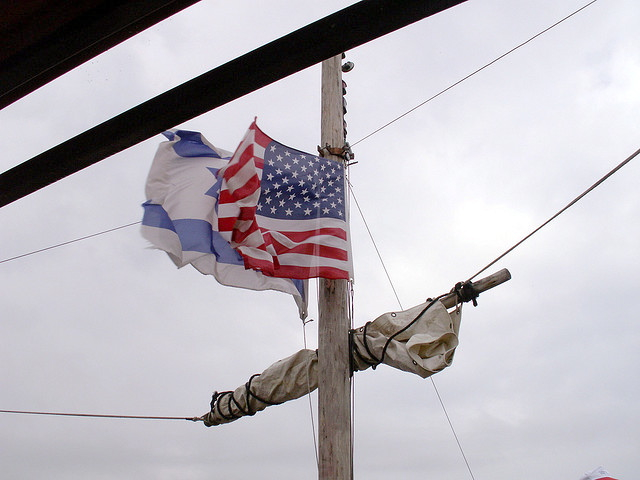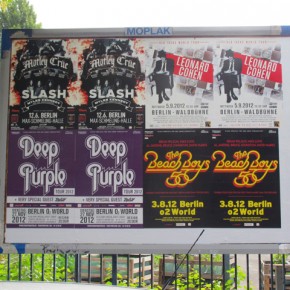Forty-five years ago, the Six Day War completely changed the face of the Middle East. The effects of that war were numerous. It is a testimony to the significance of Israel’s victory that these effects are not only still felt this day, but most powerfully in Washington, DC.
The 1967 war was the definitive, watershed moment in the process of the birth of the “special relationship” between the United States and Israel.
It didn’t start there. Israel and the US had been moving closer since the nadir of their relations after the 1956 Suez War, when President Eisenhower had forced Israel, and its allies, Britain and France, to withdraw from Egyptian territory captured during that conflict.
The US increased its military aid to Israel for some time after that. When France (Israel’s main supplier of military equipment until the Six Day War) enacted an arms embargo on Israel, the United States became Israel’s primary benefactor.
The connection between the US and Israel took a great leap forward when Lyndon Johnson became President after the assassination of John F. Kennedy. Johnson was a long-time admirer of Israel, and had sharply criticized Eisenhower for his pressure on Israel after the Suez War. A number of LBJ’s key advisers at the time were also prominent members of the Jewish community and had connections to the highest levels of the Israeli government as well.
Successive US administrations, including Johnson’s, had held fast to a policy that stressed “territorial integrity” in the region. In fact, Johnson had caused concern in the American Jewish community a few weeks before the war when he reiterated that policy.
But in the wake of the Six Day War, the United States shifted this position, tying the return of land to a comprehensive peace with the Arab states around Israel. This was a major change, and one that reflected perceived Israeli, rather than US interests, the beginning of a policy trend that has gathered momentum over the years.
There seemed to be very little thought about the implications. It allowed Israel to maintain its occupation of the territory it took in 1967, much of which it still holds to this day, and which it would have been compelled to withdraw from if the US had maintained its territorial integrity policy. In essence, it was the decision that both framed “land for peace” and made the occupation possible.
Johnson had accelerated arms sales to Israel and, using the Cold War as justification, moved heavily toward offensive weaponry, including fighter jets, after Israel’s victory. Johnson did this not only because of his personal affinity for Israel or the advice of those close to him; it was also a reflection of his obsession with public opinion and with the support of the Jewish community, which was anxious about US escalations in Vietnam at the time.
The overwhelming Israeli victory produced a sort of ideation of Israel in the US that mirrored the triumphalism that clouded sober thinking in Israel. This went far beyond Israel’s position as a key Cold War ally, and would be of great importance when the Cold War ended, leaving Israel with fewer strategic arguments to make for unwavering US support.
The special relationship thus predates the rise of the American Israel Public Affairs Committee (AIPAC) to a position of unparalleled prominence as a lobbying force on foreign policy in Washington.
In 1967, AIPAC was already in existence and it was working hard on Capitol Hill, but it did not yet have the weight of the kind of campaign financing behind it that would make it a lobby no one wanted to oppose in the future.

Congress was certainly supportive of Israel in 1967, but that concern had a different tenor than it would later. Congressional leaders before the war expressed their support of Israel and their antipathy toward Gamal Abdel Nasser of Egypt, but they were primarily concerned about keeping the US out of the conflict.
By the middle of the next decade, Congress was much more influenced by the Israel Lobby. When President Gerald Ford got upset with Israeli intransigence in their negotiations with Egypt, he called for a “reassessment” of US relations with Israel. 76 senators wrote him a letter urging him to cancel that reassessment. Massive pressure came from both houses of Congress, the result of extensive lobbying, and Ford relented.
One notes that this is not some dark conspiracy; it is lobbying, it is how the game is played in Washington. But, combined with the American fascination with Israel, fueled for years and in different sectors on Cold War politics, religion, Holocaust guilt and the David vs. Goliath image of the Jewish State, it has created a situation where the US vetoes UN resolutions that are almost verbatim reiterations of US policy, as Barack Obama did in 2011.
The Israeli urge to establish, maintain and strengthen the special relationship is obviously understandable. But has it necessarily been healthy? Obviously not for the Palestinians, or for the cause of ending this vexing conflict. But neither has it actually been good for Israel. Quite the opposite, in fact.
Today, Israelis’ greatest fear is not Iran, international isolation, the Boycott/Divestment/Sanctions Movement, or the Palestinians. Their greatest fear is loss of US support. Nothing else comes close.
That is a level of dependence that is unhealthy for any country. But it is also why Israelis have confidence that it will meet other threats, including growing global anger over an occupation that is “celebrating” its 45th birthday today.
The US has shielded Israel from the consequences of its actions, even when those actions — such as settlement expansion, and intransigence on negotiations — contravene US policies or interests. It does this because Israel is a close ally, yes, but also because Israel is a domestic, rather than a foreign policy, issue in American politics.
The result is that Israel is in a unique position. It can act as it sees fit, and the world’s only superpower will make sure that the UN Security Council takes no action in response. The US will also work to ensure that Europe, which is the main trading partner for most Israeli industries, does nothing more than cluck its tongue.
There are many reasons why Israel has continued to be in conflict every day of its existence. And, because of the nature of the conversation about Israel, one is constrained to point out that many of those reasons are not rooted in Israel’s policies and actions, but in those of its enemies.
But the special relationship with the United States is perhaps the biggest reason.
I have argued often that resolution of Israel’s conflict with the Palestinians and the Arab world faces a major obstacle in that Israel does not have sufficient motivation to make concessions. Well, the reason that Israel has so little motivation is that the US, due to the special relationship, shields it from the consequences of its actions.
Has that been helpful for Israel? In 1967, Lyndon Johnson believed he was helping Israel by unilaterally shifting US policy from one that would have required Israel to withdraw from the land it conquered to one that conditioned that withdrawal on a comprehensive peace.
That seemed like a good idea at the time, but the result was a 45-year long occupation, and another war, in 1973. It resulted in Israel, which had finally lifted martial law over its own Arab citizens, now holding millions of Arabs without basic rights for decades. It put Israel on the road to becoming a global pariah.
Jimmy Carter thought he was helping Israel at Camp David. Israel had to be virtually dragged to the table and Menachem Begin had to be pushed hard to sign an agreement, but that resulted in three decades of peace with Egypt, which included many economic benefits for both countries as well and paved the way for a peace deal with Jordan some years later.
What seems advantageous on the surface is sometimes fool’s gold. And sometimes what you don’t really want is exactly what you need. Neither Israel nor the United States needs the fool’s gold of the “special relationship.”
Photographs courtesy of Marion Doss and Aslanmedia. Published under a Creative Commons license.






What’s needed is an Eliot-Ness-type figure to bring down this AIPAC mafia. But where is one to be found in this post-heroic era?
I don’t think that’s what’s needed, Delia. in fact, I think that approach is part of the problem. Sure, AIPAC has done some shady things in its history. That’s also true of other lobbying groups, incidentally. But the bulk of their success is due to things that are perfectly legal–propaganidizing, badgering their opponents, and directing campaign funds. Most of all, straightforward lobbying of elected officials.
Even if AIPAC was less connected to the Israeli government per se, they’d still have a lot of the effect they do. In part, that is due to the fact that they capitalize on the sorts of things I describe in the article above–American idealization, almost deification, of Israel as a military power, American anti-Muslim/anti-Arab bigotry, and the stability of Israel as a country and an ally. While Israel often spits in the face of US desires, the Israeli government knows exactly when it needs to stand by the US–usually when no one else will.
All of that has a great deal of value, and AIPAC and other groups like CUFI capitalize on it. And for the most part, what they do, while often contemptible, is not only legal, it is very much in line with the way things are done in Washington. There are, granted, some incidents that are exceptions to that, but for the most part, that is the case.
We who want different policies must ask ourselves why AIPAC can do this. They represent a minority of the American Jewish community, and are generally pushing policies that US diplomats and military leaders oppose. Yes, they can mobilize a lot of money, but most Jewish money is not based on Israel and is overwhelmingly Democratic no matter what goes on with Israel, while a lot of really big donors give to the Republicans; and, even beyond that, the amount of money the Israel Lobby can mobilize is big in terms of special interests, but is far, far less than what is raised by major industries like insurance and pharmaceuticals, and is also nowhere near what is garnered by special interest groups like NRA and the AARP. So why are they so impactful?
In the end, as is so often true in life, we need to look at ourselves. It is we who allow AIPAC to wield that kind of power, we who consider ourselves progressives in the US. Where are the masses calling their representatives about an issue of importance to the Palestinians or the Israeli peace movement? The phones in DC do not ring with such calls almost at all. Where are the PACs for peace? J Street PAC is actually the top single PAC on Israel. So the potential seems to be there. But the left generally prefers to complain about the evils inherent in the system, so we abdicate any change to that system and allow right-wing activists to rule the day.
There’s plenty of potential today for change. Lots of articles in mainstream media tell much more of the truth than they used to. And I can’t tell you how often I’ve heard from congressional staffers (and once or twice, even from a Congress member) that they would do things differently on this issue if they weren’t getting close 100% of both constituent messages and campaign money from the other side of this issue.
We don’t need Elliot Ness. We need more J Street PACs, particularly some that will actually represent Palestinian issues, as opposed to the quislings at the so-called American Task Force on Palestine. We need money coming in for a just peace and for freedom for Palestinians. We need media activists working directly with editors, not just howling about media bias in left-wing outlets, to correct the messages from hasbaraniks like Michael Oren. We need to put real effort and real money into this.
Most of us do not. For most Americans who even understand that there’s a 45-year old occupation going on, it’s one among many issues. the other side doesn’t approach it that way. they are passionate and motivated and they put both their money and their time and energy where their mouths are. Our side does not. That doesn’t make AIPAC evil. It makes us failures. And that is something we can address…if we choose to.